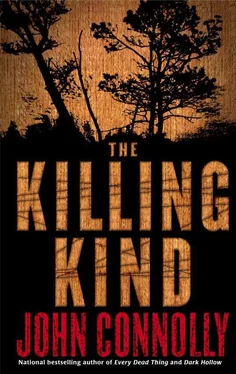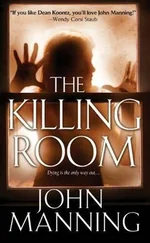The following morning she called her sister again and expressed concern that she was being followed. She couldn't say by whom, exactly; it was just a feeling she had. Her sister told her to talk to the police but Marilyn refused, arguing that she had no proof that she was being followed and had seen nobody acting suspiciously in her vicinity.
That day she left work early, pleading sickness, and returned to her apartment. When she didn't turn up for work the next morning and didn't answer her phone, her sister went to check on her, setting in motion the sequence of events that led my father to her door. The hallway was quiet, since most of the other tenants were at work or out enjoying the summer sun. After knocking, my father unholstered his weapon and kicked the door in. The A/C in the apartment had been turned off and the smell hit him with a force that made his head reel. He told the super and Marilyn Hyde's sister to stay back, then made his way through the small living area, past the kitchen and the bathroom, and into the apartment's only bedroom.
He found Marilyn chained to her bed, the sheets and the floor below drenched with blood. Flies buzzed around her. Her body had swollen in the heat, the skin stained a light green at her belly, the superficial veins on the thighs and shoulders outlined in deeper greens and reds like the tracery in autumn leaves. There was no longer any way to tell how beautiful she had once been.
The autopsy found one hundred separate knife wounds on her body. The final cut to the jugular had killed her: the preceding ninety-nine had simply been used to bleed her slowly over a period of hours. There was a container of salt by the bed, and a jar of fresh lemon juice. Her killer had used them to rouse her when she lost consciousness.
That evening, after my father returned home, the smell of the soap he had used to wash away the traces of Marilyn Hyde's death still strong upon him, he sat at our kitchen table and opened a bottle of Coors. My mother had left as soon as he came home, anxious to meet up with friends whom she had not seen in many weeks. His dinner was in the oven, but he did not touch it. Instead, he sipped from the bottle and did not speak for a long time. I sat across from him and he took a soda from the refrigerator and handed it to me, so that I would have something to drink with him.
“What's wrong?” I asked him at last.
“Somebody got hurt today,” he replied.
“Somebody we know?”
“No, son, nobody we know, but I think she was a good person. She was probably worth knowing.”
“Who did it? Who hurt her?”
He looked at me, then reached out and touched my hair, the palm of his hand resting lightly on my head for a moment.
“A dark angel,” he said. “A dark angel did it.”
He did not tell me what he had seen in Marilyn Hyde's apartment. It was only many years later that I would hear of it-from my mother, from my grandfather, from other detectives-but I never forgot the dark angels. Many years later, my wife and child were taken from me, and the man who killed them believed that he, too, was one of the dark angels, the fruit of the union between earthly women and those who had been banished from heaven for their pride and their lust.
St. Augustine believed that natural evil could be ascribed to the activity of beings who were free and rational but nonhuman. Nietzsche considered evil to be a source of power independent of the human. Such a force of evil could exist outside of the human psyche, representing a capacity for cruelty and harm distinct from our own capabilities, a malevolent and hostile intelligence whose aim was, ultimately, to undermine our own essential humanity, to take away our ability to feel compassion, empathy, love.
I think my father saw certain acts of violence and cruelty, such as the terrible death of Marilyn Hyde, and wondered if there were some deeds that were beyond even the potential of human beings to commit; if there were creatures both more and less than human who preyed upon us.
They were the violent ones, the dark angels.
Manhattan North, the best homicide squad in the city, maybe even in the whole country, investigated the Marilyn Hyde case for seven weeks but found no trace of the man in the subway. There were no other suspects. The man at whom Marilyn Hyde had simply looked for a second too long and who had, it was believed, bled her to death for his own pleasure, had returned to the hidden place from which he came.
Marilyn Hyde's murder remains unsolved, and detectives in the squad still catch themselves staring at the faces on the subway, sometimes with their own wives, their own children beside them, trying to find the dark-haired man with the too small mouth. And some of them, if you ask, will tell you that perhaps they experience a moment of relief when they find that he is not among the crowds, that they have not caught his eye, that they have not encountered this man while their families are with them.
There are people whose eyes you must avoid, whose attention you must not draw to yourself. They are strange, parasitic creatures, lost souls seeking to stretch across the abyss and make fatal contact with the warm, constant flow of humanity. They live in pain and exist only to visit that pain on others. A random glance, the momentary lingering of a look, is enough to give them the excuse that they seek. Sometimes it is better to keep your eyes on the gutter, for fear that by looking up you might catch a glimpse of them, black shapes against the sun, and be blinded forever.
And now, on a patch of damp, muddy ground by a cold lake in northern Maine, the work of the dark angels was slowly being exposed.
The grave had been discovered at the boundary of the public reserved lands known as Winterville. The integrity of the scene had been compromised somewhat by the activities of the maintenance and construction crews, but there was nothing that could now be done except to ensure that no further damage was caused.
On that first day, the emergency team had taken the names of all of the workers at the lake site, interviewed each briefly, and then secured the scene with tape and uniformed officers. Initially there had been some trouble from one of the timber companies that used the road, but the company had agreed to postpone its truck runs until the extent of the grave had been determined.
Following the initial examination the sandbag levees were strengthened, while a command post, including the mobile crime scene unit, was established in a turnaround by the side of the Red River Road, with a strict sign-in policy in place to ensure that no further contamination of the area occurred. A pathway through the scene was created and marked with tape, after which a walking tour of the ground was made with a video camera to indoctrinate the police officers who would take no direct role in the investigation.
The scene was photographed: overall views first, to preserve the essential history of the scene at the moment of discovery, then orientation shots of the visible bones, followed by close-ups of the bones themselves. The camcorder was brought into play again, this time detailing the scene instead of merely recording it. Sketches were made, a three-foot-long metal stake indicating the center point from which all measurements of distance and angles would be taken. The boundaries of Red River Road were marked and recorded, in case any widening might occur in the future to alter the territory, and GPS equipment was used to take a satellite reading of the crime scene location.
Then, the light by now almost gone, the investigators dispersed following a final meeting, leaving state troopers and sheriff's deputies to guard the scene. The autopsy team would arrive at first light, when the inquiry into the deaths of the Aroostook Baptists would begin in earnest.
Читать дальше












